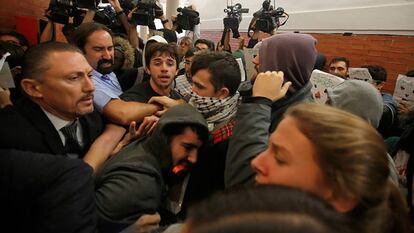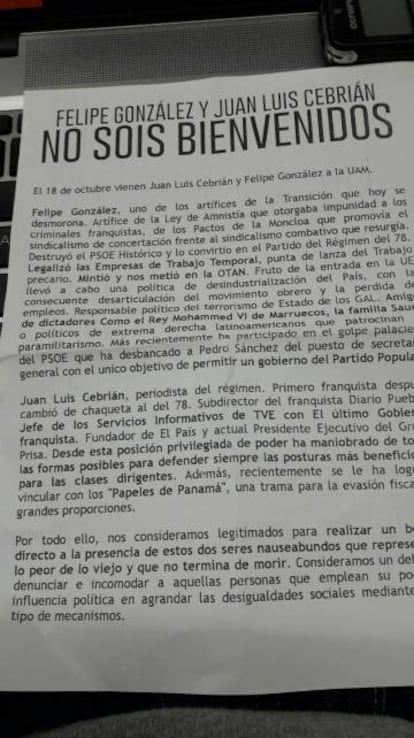Violent crowd disrupts talk by Socialist ex-PM at Madrid university
Aggressive protesters insulted Felipe González and PRISA chairman Juan Luis Cebrián

A crowd of around 200 violent protesters, many of them wearing hoods and face masks, prevented former Spanish Prime Minister Felipe González and chairman of the PRISA group (owner of EL PAÍS) Juan Luis Cebrián from speaking at a panel discussion in Madrid’s Autonomous University on Wednesday.
The event was canceled after the protesters broke into the auditorium of the Law School to cries of: “Out of this university, you fascists.” Many bore placards with the message: “You are not welcome here.”
The level of violence acquired traits that went beyond the protest. It was best to cancel the event
Antonio Rovira, law professor
The protest was organized by a group that calls itself Libertarian Student Federation, which distributed leaflets insulting both speakers and accusing them of “using their power and political influence to increase inequality.”
In recent weeks, both González and Cebrián have been blamed by leaders of the anti-austerity Podemos party, and particularly by its secretary general Pablo Iglesias, for allegedly pressuring the Socialist Party (PSOE) into delivering the executive to the Popular Party (PP) through an abstention at an upcoming investiture vote in Congress.

Spain has been in deadlock since December 20 of last year, when an inconclusive election yielded a fragmented parliament in which no force was able to secure a large enough majority to form a government. A repeat election on June 26 produced a similar result, with the PP winning the most votes both times.
Since then, the PSOE has been debating whether to keep voting down acting Prime Minister Mariano Rajoy’s attempts at reinstatement, or whether to let him form a minority government to take Spain out of its prolonged limbo. Felipe González, Spain’s longest-serving prime minister and a respected figure of Spanish Socialism, has come out in support of the latter option.
Alarmed by the violence
Several masked individuals stationed themselves at the auditorium doors to prevent people from attending the panel discussion, which was part of a series about civil society and global change organized by PRISA.

The dean of the law school, Yolanda Valdeolivas, faced the angry group and told them that their attitude was “shameful.”
Antonio Rovira, a professor of constitutional law at the university, said he was struck by the violence of the protest.
“This [protest] had been announced, but we thought it would be peaceful,” he said. “But the level of violence acquired traits that went beyond the protest. It was best to cancel the event. There was another option, which was to resort to force and clear the way, but this has to be a very exceptional option at a university.”
“They are not letting us speak inside the auditorium. We don’t know what to do in this type of situation,” added Rovira. “We are a little lost in the face of these signs of violence. The crowd came from outside this school. Today was a day for talking about things that people are allowed to disagree with. But we are persistent and stubborn, and we will try again.”
English version by Susana Urra.
Tu suscripción se está usando en otro dispositivo
¿Quieres añadir otro usuario a tu suscripción?
Si continúas leyendo en este dispositivo, no se podrá leer en el otro.
FlechaTu suscripción se está usando en otro dispositivo y solo puedes acceder a EL PAÍS desde un dispositivo a la vez.
Si quieres compartir tu cuenta, cambia tu suscripción a la modalidad Premium, así podrás añadir otro usuario. Cada uno accederá con su propia cuenta de email, lo que os permitirá personalizar vuestra experiencia en EL PAÍS.
¿Tienes una suscripción de empresa? Accede aquí para contratar más cuentas.
En el caso de no saber quién está usando tu cuenta, te recomendamos cambiar tu contraseña aquí.
Si decides continuar compartiendo tu cuenta, este mensaje se mostrará en tu dispositivo y en el de la otra persona que está usando tu cuenta de forma indefinida, afectando a tu experiencia de lectura. Puedes consultar aquí los términos y condiciones de la suscripción digital.








































